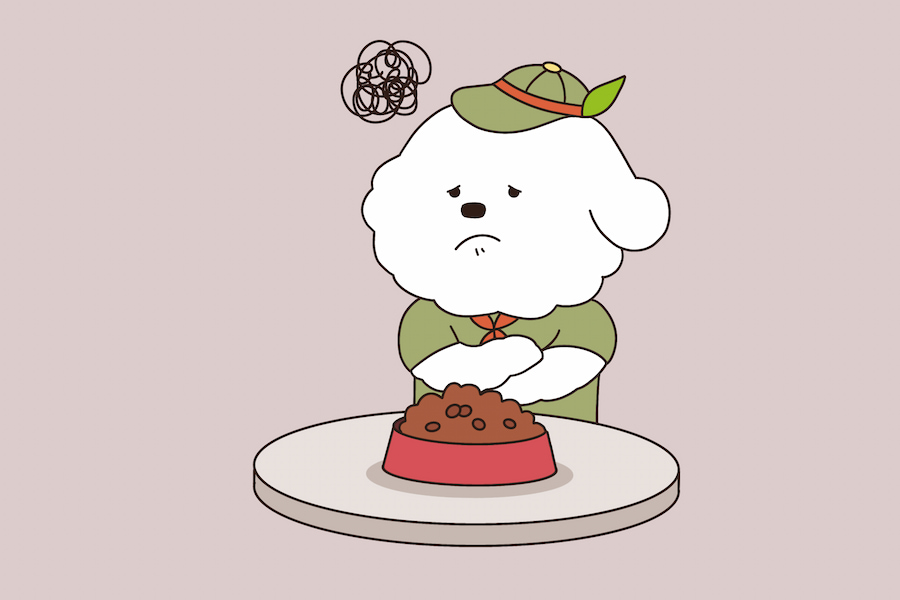Liver disease is a very serious and complex condition in dogs and it can affect pups of all ages and breeds. The liver in the dog has a main role in digestion, metabolism, detoxification, and storage of nutrients in the body, and if it’s not working it’s a point of concern. There are many factors from genetic predisposition to infectious agents that can be cause of liver disease in dogs.
If you understand the symptoms, cause, diagnosis, and treatment of liver disease then you can easily manage this problem and improve the overall health and well-being of your furry friend. Here in this blog, we will discuss everything in detail about liver disease in dogs.

Lee&Pol offers dried pollock treats for your dog’s liver health, removing all bones and salt over 24 hours to make it safe for dogs to enjoy.
What Is Liver Disease In Dogs?
Liver disease in dogs is defined as any condition that affects the structure or functions of the liver and impairs its ability to work properly in the body. The liver is the main organ of the body that can perform many metabolic processes essential for the body. When the liver gets damaged by any disease like pancreatitis, diabetes, or other problems it causes many health complications.
However, there is nothing to worry about i have seen liver disease cases in dogs that are cured but it depends on the causes and stage of the disease.

If the cause of the disease is diagnosed in early stages your pup can live a happy and healthy life.
Types of Liver Diseases in Dogs
Liver diseases in dogs mean a range of conditions that have different, causes, symptoms, and treatments. Some different liver diseases seen in dogs are:
Hepatitis
Hepatitis is defined as inflammation of the liver and it can acute or chronic problem.
- Acute hepatitis: Acute hepatitis occurs because of infectious agents like viruses (canine adenovirus), bacteria (leptospirosis), and toxins (medicine and plant).
- Chronic hepatitis: Chronic hepatitis takes time to develop and it is often associated with immune-mediated problems and metabolic issues.

Hepatitis is a clinical sign that is shown as a result of a disease. Dogs are vaccinated against the viral cause of liver disease like leptospirosis.
Fatty Liver Disease or hepatic lipidosis
This condition occurs because of the accumulation of excess fat in the liver cells that disrupt the normal liver function. Hepatic lipidosis occurs as a secondary problem to other conditions like diabetes mellitus, obesity, or prolonged anorexia. It is also associated with metabolic issues like nutritional balance.
Cirrhosis
Cirrhosis in dogs is defined as a progressive and serious condition that occurs due to the formation of scar tissue in the liver. The scarring damages the healthy liver tissue and it also affects the normal structure and function of dogs. Cirrhosis is an end-stage liver problem that occurs after long-term damage to the liver. Different medicines, chemicals, and environmental factors also cause long-term damage to the liver leading to cirrhosis.
Liver Shunts
Liver shunts are abnormal blood vessels that bypass the liver and allow the toxins to enter the bloodstream. This blood contains toxins and results in a buildup of toxins in the body. Liver shunts can also be present at the time of birth and the signs that may appear are neurological abnormalities, stunted growth, and urinary tract issues.
Cholangitis
It is defined as inflammation of bile ducts but it can further extend to another organ like the liver and is known as cholangiohepatitis. This condition can be chronic or acute and there are different causes behind it like immune-mediated reactions, infectious agents, and bile duct obstruction.
Copper Storage Disease
In this disease, there is a lot of copper accumulated in the liver and because of it, the liver is not able to remove all of it from the body either because of genetics or because of diet having a high amount of copper.
Liver Cancer
Tumors in the liver can be malignant and benign. Different types of cancer in dogs are hepatocellular adenoma and hepatocellular carcinoma. The most obvious signs that will appear in liver cancer are weight loss, abdominal in, lethargy, and jaundice.

Liver Cancer mostly originate from within the liver but sometimes they also originate from the other part of the body as well.
Dog Liver Disease Symptoms
When your dog is suffering from liver disease there will be different signs and symptoms, which will depend on the cause of the disease, the condition of the dog, and the severity of the problem. Some common signs that you will see are:
- Jaundice (icterus)
- Vomiting and diarrhea
- Decreased appetite
- Weight loss
- Increased thirst
- Frequent Urination
- Lethargy and weakness
- Abdominal distension
- Behavioral changes
- Neurological symptoms
- Pale gums
- Bleeding abnormalities

If these symptoms appear, it is best to see your vet immediately for a check-up.
What Causes Liver Disease In Dogs?
It is one of the common problems affecting dogs of all ages and breeds. The different issues that contribute to this problem are:
- Most commonly genetic factors play a major role in the occurrence of this disease. Liver disease is common in Chihuahuas, Poodles, West Highland Terriers, Golden retrievers, etc.
- By ingesting toxic substances like plants for example mushrooms, ragwort, artificial sweeteners, and moldy corn liver failure can occur.
- When the dog eats fatty food for a long time it will increase the chances of liver disease in dogs.
- Any trauma or injury to the liver can cause liver disease.
- Sometimes liver diseases occur as a side effect of another disease like diabetes or obesity that appears along with problems in the pancreas.
- In senior dogs, liver dysfunction is very common.
How To Diagnose Liver Disease In Dogs?
If you feel that your dog is not feeling well and when you take them to the vet, most likely your vet will carry out different tests, like ultrasounds, x-rays, and blood tests. If it appears in the test that your pup is having any kind of liver dysfunction, then they will carry out a biopsy and take a tissue sample for further tests. By these tests, your vet will know the type of disease your pup is suffering from, what is their current condition and what is the right way to manage this problem.
How to Treat Liver Disease In Dogs?
The first step in treating your pup is to feed them the right food as it helps in managing the liver disease in your dog. If the liver of your dog is not able to process what they are eating then it will worsen the condition and make your pup’s life more miserable. The treatment for liver dysfunction is dependent on the liver damage. Other things you can do are:
- Switch your dog’s diet to a diet that is easier for their liver to process as it is the most important part of treatment.
- Start adding nutritional supplements in their diet like Omega 3 fatty acids, and milk thistle to improve their well-being.
- Your vet will prescribe some medication like immunosuppressive drugs, antibiotics, or nausea medication to manage the dog’s sickness.
- If there is dehydration then fluid therapy should be started.
- Other measures that need to be taken are measuring blood pressure, and taking your pup to a veterinary clinic for regular checkups.
What To Feed A Dog With Liver Problems?
It is difficult to know what to feed a pup suffering from liver disease, but it’s an important part of their treatment to switch their diet to a hepatic diet. You will advised to feed a hepatic diet to your dog that is made especially for dogs and that contains all the supplements and will not put any extra stress on their liver. Hepatic food also needs to be flavorful as dogs with faulty liver don’t like to eat anything.
Best Foods For Dogs With Liver Disease☺️
As your pup is suffering from liver disease you need to adjust their diet and choose what is best for them.
- Always select the option that has high-quality protein and is very easy to digest like chicken, beef, fish, and turkey. Protein is an essential part of maintaining overall health and muscle mass but increased protein intake will put more stress on the liver. Feed your dog lean meat like turkey, chicken, or beef. Consult with your vet about the right amount of protein according to their needs.
- Choose foods that are low in fat to avoid fatty liver. Don’t feed oily food instead feed them dried pollock as it is a good source of protein and other nutrients.
- Feed your pup’s complex carbohydrates like oats, barley, rice, and sweet potatoes. These carbohydrates give energy without putting any additional burden on their liver.
- Add such sources to your dog’s diet that has essential fatty acids like omega-3 fatty acid. This fatty acids improve their skin and coat health.
Dangerous Foods For Dogs With Liver Disease😭
- Don’t feed a diet that has excess sodium in it as high sodium intake will cause fluid retention and further worsen their health. Stop feeding foods like canned soups, cured meats, and other salty snacks.
- Food like duck, pork, lamb, and offal are high in copper so stop them to your dog.
- Those foods that contain artificial sweeteners, preservatives, colors, and high sugar are also dangerous for them.

Lee&Pol’s dried pollock is not only rich in omega-3 and high-quality protein, but also low in fat and salt-free. This makes it the perfect treat for your dog’s liver health!
Conclusion
All dogs suffering from liver disease will show different signs and symptoms and they depend on the cause and severity of the disease. If you feel that your pup has liver disease seek help from your veterinarian. They will perform different tests do proper diagnosis and then recommend treatment. Additionally, you can manage their diet and control all those foods that are high in fat, salt, and sugar as they are not good for your dog.
FAQ
Blueberries are considered super food for humans if fed in moderation and they are also good for dogs and are recommended for their liver. Blueberries also contain anthocyanins which protect dogs from oxidative stress.
Some pet owners recommend not to feed bananas to dogs because of their high sugar and high-fat content but it’s not true. Bananas are high in vitamin B and are good for dogs if fed in moderation.
Eggs are an excellent source of protein and good for dogs suffering from liver disease. Eggs are rich in nutrients and are easy to digest and they are a good alternative to protein and can be fed to dogs on a hepatic diet.



